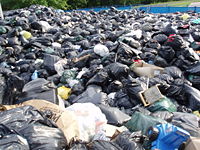Garbage
Garbage, trash, or (in British English) rubbish, is the byproduct of the disposed waste created by a society. The terms garbage and rubbish are more or less a 'catch-all' term for items that are viewed as disposable, or that can be "thrown away". Other terms that may be used to describe garbage are waste, litter, and refuse; however these terms often mean something specific when used in appropriate context, e.g. human waste.
Trash Management
Garbage, once disposed of, is usually collected by a waste-management company (which may be a municipality) or a privately run contract, depending on the agreement made by the government of the city, county, state, or country. After it is collected, it is hauled away by trucks to either dumps (also known as landfills), or to processing facilities where it is then filtered of recyclable materials and then incinerated, pulverized, or deposited at another location.
Disposal of trash can be a problem in itself: if not managed correctly, sites where trash is deposited can over-run into the main populace areas of the city. Currently Naples,Italy is experiencing a major problem with trash building inside the city limits[1] due to excess waste produced by the population and the handling of the trash management contract by the local mafia[2].
Throughout history, there have been creative ways of disposing of trash. One option is to mix layers of solid waste (non-liquid and non-gaseous waste) with layers of soil. This was done to create Mount Trashmore Park, located in Virginia Beach, VA.[3]. Mount Trashmore is approximately 165 acres of composted trash, reaching 60 feet high and spanning over 800 feet long.
In many parts of the world, trash is burned. Unfortunately the gas produced by the burning of trash is often toxic and poses an environmental and health hazard; so much so that the EPA has established a website[4] that includes links to laws, regulations, and hazards.
Trash classification
Not all trash is created equal. In the United States, there are laws and regulations that determine how specific kinds of trash much be handled. For example: medical waste(items such as needles, test tubes, gloves, testing materials) is classified as "biohazard" materials and must be handled appropriately. Even household chemicals, and containers, for such things as drain cleaners and paint must be treated as hazardous materials. Discarded electronic equipment both may contain hazardous materials such as mercury, as well as traces of gold plating and other materials that economically justify separate recycling.
With an increasing recycling movement, more and more separations are used. "Trash" tends to imply dry material and "garbage" wet (e.g., food waste). Dry materials, based on different recycling, may be sorted into conventional paper, glazed paper (e.g., magazines), cardboard, plastic, glass and aluminum. In one major high-technology firm, where the coffee rooms have an extensive range of sorting containers, a ritual for new employees is to ask them whether empty coffee bags, made of aluminum coated Mylar, should go into "plastic" or "metal."
References
- ↑ Associated Press (2008-01-05). Clashes as Naples' trash piles up. CNN. Retrieved on 2008-01-09.
- ↑ Vinci, Alessio (2008-01-08). Why Naples is drowning in garbage. CNN. Retrieved on 2008-01-09.
- ↑ Mount Trashmore Park:Virginia is for Lovers. Virginia Tourism Corporation. Retrieved on 2008-01-10.
- ↑ Backyard Burning / Wastes / EPA. United States Environmental Protection Agency (2007-09-04). Retrieved on 2008-01-10.
